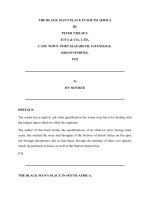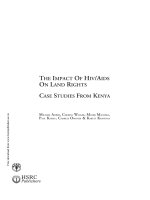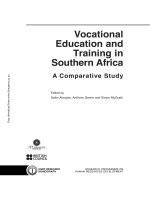HIV /AIDS in Southern Africa pdf
Bạn đang xem bản rút gọn của tài liệu. Xem và tải ngay bản đầy đủ của tài liệu tại đây (512.43 KB, 21 trang )
Projects funded by the WK Kellogg Foundation on
HIV/AIDS in southern Africa
Report of the Colloquium
26–27 November 2003
Free download from www.hsrc
p
ress.ac.za
HUMAN SCIENCES
RESEARCH COUNCIL
SOCIAL ASPECTS OF HIV/AIDS AND
HEALTH RESEARCH PROGRAMME
Projects funded by the WK Kellogg Foundation on
HIV/AIDS in southern Africa
Report of the Colloquium
26–27 November 2003
Phetsile K Dlamini, Donald Skinner & Nompumelelo Zungu-Dirwayi
Free download from www.hsrc
p
ress.ac.za
iv
Compiled by the Social Aspects of HIV/AIDS and Health Research Programme of the Human
Sciences Research Council (HSRC)
Funded by the WK Kellogg Foundation
Published by HSRC Publishers
Private Bag X9182, Cape Town, 8000, South Africa
www.hsrcpublishers.ac.za
© 2004 Human Sciences Research Council
First published 2004
All rights reserved. No part of this book may be reprinted or reproduced or utilised in any form
or by any electronic, mechanical, or other means, including photocopying and recording, or in
any information storage or retrieval system, without permission in writing from the publishers.
ISBN 0 7969 2068 0
Cover by Jenny Young
Production by comPress
Distributed in Africa by Blue Weaver Marketing and Distribution,
PO Box 30370, Tokai, Cape Town, 7966, South Africa.
Te l: +27 +21-701-4477
Fax: +27 +21-701-7302
email:
Distributed worldwide, except Africa, by Independent Publishers Group,
814 North Franklin Street, Chicago, IL 60610, USA.
www.ipgbook.com
To order, call toll-free: 1-800-888-4741
All other inquiries, Tel: +1 +312-337-0747
Fax: +1 +312-337-5985
email:
Free download from www.hsrc
p
ress.ac.za
Contents
Introduction 1
An outline of the Kellogg projects 2
Day one: HIV/AIDS policy in six southern African countries 4
Opening address: Dr Phetsile Dlamini 4
Background to the involvement of WKKF: Bishop Malusi Mpumlwana 4
Overview of the HIV/AIDS policy project: Dr Olive Shisana 5
HIV/AIDS policy: Dr Lucky Odirile 6
A comparative analysis of prevention and care projects:
Ms Mpumi Zungu-Dirwayi 7
Legal issues: Ms Marlize Richter 7
Financing of HIV/AIDS in the six southern African Countries:
Dr Olive Shisana 8
Drug policies: Dr Henry Fomundam 9
The health strategy of the New Partnership For Africa’s Development
(NEPAD): Prof. Eric Buch 10
Day two: The development, implementation and evaluation of
interventions for the care of OVC in Botswana, South Africa
and Zimbabwe 12
An Overview of the WKKF-funded OVC research programme:
Prof. Leickness Simbayi 12
The WKKF OVC programme: Dr Phetsile Dlamini 12
Implementing interventions to improve the social conditions,
health, development and quality of life of OVC: Mr Jephias Mudondo 14
Interventions to support families and housefolds:
Ms Ntjantja Ned
Strengthening community-based support systems as a way of
supporting vulnerable children: Pastor Adrian Mpofu 15
Lessons learned from OVC projects so far: Dr Donald Skinner 15
Summing up: Ms Ntjantja Ned 16
v
Free download from www.hsrc
p
ress.ac.za
1
Introduction
In November of 2003, the Human Sciences Research Council (HSRC) and the
WK Kellogg Foundation (WKKF) hosted a colloquium to present and review
the research that the HSRC has conducted with the support of the Foundation
in projects across six southern African countries namely, Botswana, Lesotho,
Mozambique, South Africa, Swaziland, and Zimbabwe. The two-day event was
designed to cover the two focal areas of the work; thus the first day focused on
the policy research that has been done across the six countries in southern
Africa, and the second day looked at the work that has been done with
orphaned and vulnerable children (OVC) in Botswana, South Africa and
Zimbabwe.
The colloquium was seen as an opportunity to report back to the WKKF and
to local stakeholders, including representatives from government, service
providers in health and social development, state policy and regulatory
bodies, academics and researchers, intervention workers from both NGOs and
state services, policy makers and interested advocates around policy and
children. Work at the colloquium was directed at using the forum to facilitate
as much discussion and debate as possible. The event was also designed to
serve as a space for networking and social connection between all the
organisations involved.
In that light the following themes were used as starting points for discussion
and to structure the programme at the colloquium:
• Financing of HIV/AIDS programmes in southern Africa;
•Legislation affecting people living with HIV/AIDS in the six countries;
•HIV/AIDS policies and strategic plans in the six countries;
•Access to HIV/AIDS prevention and care services;
• Pharmaceutical policies and infrastructure for the provision of
antiretroviral drugs in the six southern African countries;
•Interventions aiming to improve social conditions, health, development
and quality of life of vulnerable children and orphans;
Free download from www.hsrc
p
ress.ac.za
•Interventions aiming to provide support to families and households
coping with an increased burden of care for affected and vulnerable
children;
•Interventions aiming to strengthen community-based support systems as
an indirect means to support vulnerable children.
An outline of the Kellogg projects
As the principle aim of the colloquium was to examine the work of two multi-
country projects, it is important that the basic aims and philosophies of these
two projects be understood. These are outlined briefly below.
HIV/AIDS policy in six southern African countries
As part of its commitment to assist economic and social development in
southern Africa, the WKKF has established an Integrated Rural Development
Program (IRDP) to contain the spread of HIV and mitigate the impact of
HIV/AIDS in rural communities. With this goal in mind WKKF, through the
Centre for Applied Social Sciences at the University of Zimbabwe
commissioned the Social Aspects of HIV/AIDS and Health Research
Programme of the HSRC in South Africa, to undertake a review of the
situation on HIV/AIDS in six southern African countries (Botswana, Lesotho,
Mozambique, South Africa, Swaziland, and Zimbabwe); to put forward
recommendations to WKKF to strengthen its policy in this area and to guide
its future work in the area of HIV/AIDS and rural development. The study
also meant to analyse HIV/AIDS policy, legislation, financing and implemen-
tation of programmes in the six countries. By the time of the colloquium, the
following research processes had been undertaken:
•Key-informant interviews were conducted to obtain all primary data on
policy and strategy;
•Legislation affecting people living with HIV/AIDS in the six countries was
reviewed and the progress countries have made in implementing the UN
international agreements and guidelines was assessed;
•HIV/AIDS policies and strategic plans in the six countries, as well as
documented case studies, were subjected to a detailed review;
REPORT OF THE COLLOQUIUM ON HIV/AIDS PROJECTS
2
Free download from www.hsrc
p
ress.ac.za
•Access to HIV/AIDS prevention and care services was investigated in all
six countries, based on surveys of the population in the nine sites where
WKKF is implementing the IRDP;
•Information was compiled on HIV/AIDS evidence-based behaviour
interventions suitable for implementation in the six countries.
The development, implementation and evaluation of interventions for
the care of OVC in Botswana, South Africa and Zimbabwe
The HSRC has been granted funds by WKKF to implement research-driven,
evidence-based, intervention programmes to assist children, families and
communities affected by HIV/AIDS in Botswana, South Africa and Zimbabwe
over five years. This programme is contributing towards the development of a
strategy for the care of OVC in Botswana, South Africa and Zimbabwe; with
the potential of deploying these strategies in other parts of Africa as well. The
strategy will be informed by research that supports innovative and sustainable
models that target OVC, as well as families and households coping with an
increased burden of care for affected children.
The programme aims at a holistic response so efforts are directed at all levels
which are needed to ensure adequate support for OVC, namely the vulnerable
children and orphans themselves; households with vulnerable children; and
communities where vulnerable children and orphans are concentrated.
The goals of the programme are to:
•Improve the social conditions, health, development and quality of life of
vulnerable children and orphans.
•Support families and households coping with an increased burden of care
for affected and vulnerable children
•Strengthen community-based support systems as an indirect means to
support vulnerable children.
•Build capacity in community-based systems for sustaining care and
support to vulnerable children and households over the long term.
INTRODUCTION
3
Free download from www.hsrc
p
ress.ac.za
Day one: HIV/AIDS policy in six
southern African countries
Opening address: Dr Phetsile Dlamini
The official opening address was given by Dr Phetsile Dlamini, in which she
emphasised the gravity of the HIV/AIDS epidemic in Africa with southern
Africa being the epicentre. Two key problems in responding were a lack of
local research, leading to a dependence on information from Europe and the
USA where context is often different; and the gap between researchers, policy
makers and implementers. She expressed the hope that meetings of this
nature, and the support that WKKF had provided, would continue to develop
local, evidence-based research and close partnerships between all the
stakeholders in all six countries.
Background to the involvement of WKKF:
Bishop Malusi Mpumlwana
Bishop Malusi Mpumlwana, Regional Director of the WKKF, gave the
background of WKKF involvement with HIV/AIDS and OVC. As part of its
75th anniversary celebrations, the WKKF developed a vision of working with
children and families to empower people in affected communities. This vision
led to the creation of a programme, ‘Socio-economic transformation of the
southern African region towards healthy, viable and sustainable rural
communities’ which has put special emphasis on women, youth and families.
A systems-change approach is being applied based on four pillars of action.
1. Economic opportunities through support for:
•Rural financing to empower rural communities;
•Viable rural enterprises;
•Market systems to support the rural enterprises;
•Commodity associations;
• Land tenure to ensure a resource base.
4
Free download from www.hsrc
p
ress.ac.za
2. Leadership and skills development to enhance:
•Modern and indigenous African leadership systems;
•Productive social, economic and life skills;
•Policy engagement;
•Culturally sensitive knowledge development systems.
3. Health and well-being to encourage development that focuses on:
• HIV/AIDS and OVC programmes;
•Nutrition and food security
•Community-based health systems.
4. Civic responsibility to promote:
•Social visioning for self-drive;
•Further policy engagement and capacity building;
•Social giving;
•Human safety and security.
He wished the meeting well and encouraged the researchers to produce good,
evidence-based research and to share those experiences effectively for the
development of Africa as a whole.
Overview of the HIV/AIDS policy project:
Dr Olive Shisana
This project drew on the research results across Botswana, Lesotho,
Mozambique, South Africa, Swaziland and Zimbabwe. Dr Shisana emphasised
the importance of looking at the themes across the six countries but, more
importantly, of using this research to establish a dialogue between researchers
and government in each country.
The high prevalence of HIV/AIDS in the region (65 per cent of all people
living with the HIV/AIDS worldwide live in the SADC countries) makes this
research critical. Amongst the countries involved in the study, Botswana has
the highest prevalence at 38.9 per cent of the population. Zimbabwe and
Swaziland have similar levels of infection, while South Africa has the largest
number of people living with HIV/AIDS, namely 4.5 million people aged two
years and older.
DAY ONE: POLICY
5
Free download from www.hsrc
p
ress.ac.za
One of the key focuses for the study was to examine progress made by African
leaders who were party to the Declaration on the Commitment to HIV/AIDS at
the UN General Assembly Special Session on HIV/AIDS held in June 2001.
Heads of state and governments made an undertaking that, by 2003, they
would have developed multi-sectoral, national and strategic plans which
directly address the epidemic. Great concern was expressed around the fact that
leaders of many countries made commitments in international forums, but
undertook little active work to honour these commitments at a national level.
The paper introduced some of the key debates of the day, and Dr Shisana
called on each of the speakers to answer the critical question of whether the
policies in the countries were appropriate for the challenges posed by the
pandemic, and would ensure that the human rights of people with HIV/AIDS
were protected.
Discussion focused on the prevalence rates in countries, comparing the
antenatal sentinel-surveillance approach with other methods like the baseline
survey done in South Africa. It was proposed that incidence rates would
enable researchers to more accurately gauge the impact of education on
preventing new HIV infections.
HIV/AIDS policy: Dr Lucky Odirile
Dr Lucky Odirile presented a comparison of the current status of policies in
the six countries. South Africa was shown to be the only country with
comprehensive laws and policies that respond to the challenge of HIV/AIDS.
Policy development in the other countries had lagged with research showing
that some countries had only partially addressed this issue while others had
no effective policies.
The question of whether the policies are adequate could not be answered. It
was noted that each country is different and has different challenges and goals
in mind when designing its policies. It was also proposed that countries could
learn from each other’s policies. For example, Botswana was the only country
that had implemented their ARV policy and made ARV’s available through
the public health system. Monitoring and implementation was identified as a
challenge in many countries that do have good policies.
REPORT OF THE COLLOQUIUM ON HIV/AIDS PROJECTS
6
Free download from www.hsrc
p
ress.ac.za
A comparative analysis of prevention and care projects:
Ms. Mpumi Zungu-Dirwayi
Ms. Mpumi Zungu-Dirwayi noted that all the countries studied had national
HIV/AIDS policies and strategic plans that dealt with prevention of HIV. The
major prevention programmes centred around the distribution of condoms
and HIV/AIDS awareness campaigns. Prevention of mother to child
transmission (PMTCT) had also been incorporated into strategic plans with
coverage increasing every year in all the countries studied. Many countries
had also already set up voluntary counselling and testing (VCT) sites and were
attempting to increase these sites within the countries. Countries leading in
provision of PMTCT and VCT were South Africa, Botswana and Zimbabwe.
The smaller countries lagged behind but were in the process of increasing
their delivery.
It was proposed that a greater focus on the prevention of new infections was
required. The greatest challenge is to develop intervention programmes that
impact on behaviour change and encourage risk-free sexual behaviour in
young people. Stigma was also an area of concern, as it had affected a number
of interventions, particularly around mother-to-child transmission where it
impacted on the use of formula feeding. The importance of the socio cultural
setting was emphasised again.
Legal issues: Ms Marlize Richter
Ms Marlize Richter presented a study of the legal provisions in the six
countries, looking particularly at issues of human rights, discrimination and
gender sensitivity. Awareness of these issues, particularly of gender sensitivity,
was found to be lacking in the legislation in most countries. One particularly
important challenge raised was the integration of customary/traditional laws
which tend to be unwritten.
This study showed that, while South Africa has comprehensive laws that touch
on the different areas of HIV/AIDS, many of the other countries had not set
up specific legislation around many of the key areas. There was also a
disturbing pattern of using legislation and traditional law in ways that
discriminated against women, thus making them more vulnerable to
DAY ONE: POLICY
7
Free download from www.hsrc
p
ress.ac.za
infection. Even international conventions were found to not give people living
with HIV sufficient recourse against stigma and discrimination. It was
proposed that areas that require clear legislation include:
•Children and HIV/AIDS;
•Gender discrimination generally and in relation to HIV/AIDS;
•Antiretroviral availability;
•Funding for activities related to HIV/AIDS.
Financing of HIV/AIDS in the six southern African
countries: Dr Olive Shisana
This study assessed the financing provided for HIV/AIDS programmes in two
ways. This was assessed, firstly, as a percentage of the amount actually required
to deal with the problem of HIV/AIDS. Secondly, it was assessed against
commitments African leaders had made in Abuja in 2001 to use 15 per cent of
their national budgets on health.
HIV/AIDS expenditure was defined as either core, that is dedicated to specific
programmes such as VCT or home-based care; or expanded,which includes
other expenditure incurred by health care facilities, such as the treatment of
opportunistic infections. Some of the salient observations were:
•A comparison of the gross national product of the six countries showed
large differences. Botswana and South Africa have the highest figures and
Zimbabwe has the lowest;
•The Human Development Index of 1975 to 2003 shows a decline in all
countries except for Mozambique, which was lowest and is now showing
some growth following the end of the war;
• Data was obtained from Ministries of Health as well as Finance and
Treasury. Some information also came from surveys such as
income/employment studies and household surveys as well as reports
from multilateral agencies.
The percentage of national budget spending on health in the six countries is
currently:
•Zimbabwe 15.6 per cent;
•South Africa 15.4 per cent;
REPORT OF THE COLLOQUIUM ON HIV/AIDS PROJECTS
8
Free download from www.hsrc
p
ress.ac.za
•Botswana 10.4 per cent;
•Mozambique 8.8 per cent;
•Lesotho 7.4 per cent;
•Swaziland 7.4 per cent.
It is significant that, even with a struggling economy, Zimbabwe is committing
a lot towards its health budget.
Per capita expenditure on HIV/AIDS ranged from a high in South Africa of
US$ 255, to a low of US$9 in Mozambique. Many countries are currently
increasing their spending on HIV. In South Africa, it was projected that the
ARV rollout will create general improvements in the health service, such as
additional training for staff and access to additional resources.
It was noted that the six countries account for one third of the world’s
HIV/AIDS burden but have access to considerably less than a third of the
world’s spending on HIV. The magnitude of the HIV/AIDS burden in these
six countries calls for the prioritisation, protection and targeting of HIV/AIDS
spending.
The Global Fund allocation to the six countries aims to complement what the
countries themselves are spending on HIV/AIDS. It was noted that it is
important for countries not to rely solely on donor funding and risk
programme collapse when that funding stops, especially if there are high
recurrent costs. Some countries in the group would be particularly vulnerable
in this regard and need to maintain their own financial commitment to
addressing HIV. The ability of the country to absorb increased resources from
the Global Fund for health care will determine whether the increased
resources translate into increased outputs and outcomes.
Drug policies: Dr Henry Fomundam
Dr Henry Fomundam gave a presentation on drug policies in the six countries
and the challenges of ARV rollout. He warned against taking the issue of ARV
medication too lightly. Developing and implementing an ARV drug policy
requires countries to address challenges such as developing an essential drug
list, having a drug regulatory authority, linking with international guidelines,
DAY ONE: POLICY
9
Free download from www.hsrc
p
ress.ac.za
building infrastructure and human resources, initiating procurement and
distribution processes as well as monitoring resistance and adherence.
It was noted that drug policies varied across the six countries. All had adopted
an Essential Drug List with some differences in implementation. South Africa
and Botswana have a comprehensive ARV policy. ARVs, which are new,
present specific challenges including:
•The monitoring of generic drugs;
•The creation of adequate infrastructure – national and regional guidelines
need to be developed to take into account resource limited contexts, and
international guidelines should also be complied with;
•Medical staff need specialised training in administering ARVs – adherence
is crucial as drug resistance could have serious complications for the
epidemic.
•Issues of storage and checking of the quality of the drugs.
Given the newness of ARVs, and the size of interventions like a rollout of
ARVs, there is a need for operational research. The situation of HIV/AIDS
treatment is dynamic with new findings and changes in costs and purchasing
patterns happening regularly. A number of options were raised around
enabling greater acquisition of ARVs including group purchasing and
voluntary and compulsory licensing.
The health strategy of the New Partnership For Africa’s
Development (NEPAD): Prof. Eric Buch
Prof. Eric Buch gave an overview NEPAD’s medium term health strategy,
which was formulated to foster the goal of Health for All beyond the year
2000. He pointed out that multi-sectoral approaches are generally advocated
in all of NEPAD’s programmes and the health strategy thus follows an
integrated approach to addressing the disease burden of Africa. Twenty heads
of state meet four times each year to review progress on all of NEPAD’s
priority areas allowing for a constant monitoring of the strategy. Prof. Buch
emphasised that NEPAD is not an implementing agency but a catalyst.
REPORT OF THE COLLOQUIUM ON HIV/AIDS PROJECTS
10
Free download from www.hsrc
p
ress.ac.za
DAY ONE: POLICY
11
The key points of NEPADs health strategy are:
•Government support and stewardship is critical for success;
•Health systems need to be built up and secured with special focus on the
peripheral health systems;
•Programmes to reduce the burden of both communicable diseases,
including HIV/AIDS, and non-communicable illnesses must be
strengthened;
•Skilled care must be provided for women around pregnancy and
childbirth – maternal and infant mortality rates are still too high in Africa;
•Individuals and communities must be enabled to improve their own
health;
•Resources must be effectively mobilised and utilised;
•There must be equity for the poor, displaced and marginalised.
The following priorities were identified in NEPAD’s initial programme of
action around HIV/AIDS:
•The prevention of new infections especially in youth;
•Making ARVs accessible and affordable;
•Supporting VCT programmes; and
• Ensuring that there is a high standard of health care.
The research areas that NEPAD supports include work that opens up new
strategies and aims at filling gaps in the areas of concern, as well as multi-
country projects. It is felt that there is a gap between research and policy that
needs to be narrowed.
Free download from www.hsrc
p
ress.ac.za
Day two: The development,
implementation and evaluation of
interventions for the care of OVC in
Botswana, South Africa and
Zimbabwe
An overview of the WKKF-funded OVC research
programme: Prof. Leickness Simbayi
This presentation provided a regional picture of the current levels of
orphanhood related to HIV/AIDS. It was noted that global estimates (such as
that there will be 40 million orphans by year 2010) were high, but still
underestimated the situation as they only defined children as orphans up to
the age of 15, and did not include children in affected communities that were
rendered vulnerable by HIV or other factors in their environments. It was
noted that, in the countries working on this project, about 60 per cent of
children live in poverty. It was proposed, therefore, that African countries,
including the countries working on this project, should establish their own
definition of OVC so as to be able to target interventions most effectively.
It was noted that United Nations General Assembly had pledged to set up
national structures to care for the children via National Committees on
Children to attend to the issues of OVC. Their role would include doing
national baseline surveys on OVC and monitoring and evaluating
intervention programmes aimed at assisting OVC. The WKKF contribution to
this has been vitally important in this development.
The WKKF OVC programme: Dr Phetsile Dlamini
Dr Dlamini presented an overview of the WKKF’s OVC project which is
working in Botswana, South Africa and Zimbabwe. She emphasised that
12
Free download from www.hsrc
p
ress.ac.za
DAY TWO: CARE OF ORPHANS AND VULNERABLE CHILDREN
13
community organisations, CBOs and NGOs, were already doing a lot of work
in caring for orphans and noted that the WKKF programme sought to
strengthen already existing initiatives and, in turn, the communities and
households that these organisations serve. Ultimately the project aims to
identify the best practices in use in managing the issues of OVC in southern
Africa. Visits to individual projects in the three countries had already yielded
some information on interventions that could be improved and shared.
Discussion
An active and extended discussion followed these two presentations. The
following were focus areas for discussion:
•The psychosocial needs of children are very important and need to be
adressed in addition to their material needs;
•Support for OVC and other children with HIV is of paramount
importance;
•Single parent families that are struggling should be included in support
programmes;
•The term ‘vulnerability’ needs to be defined so that no children would be
inadvertently left out of interventions that could benefit them;
•Poor resources, unclear policies and legislation affecting OVC (such as
questions of inheritance) must be addressed in implementing OVC
intervention programmes;
•The focus should also be on prolonging the parents’ lives so as to reduce
the number of orphans. The ARV-rollout policies in Botswana and South
Africa were hailed as important steps in the right direction;
•Safety measures must be put in place to protect OVC against incest and/or
child abuse by the caregivers or those around them;
•It was noted that some children were vulnerable even though their parents
were alive and that courses to improve parenting skills are required.
Free download from www.hsrc
p
ress.ac.za
REPORT OF THE COLLOQUIUM ON HIV/AIDS PROJECTS
14
Implementing interventions to improve the social
conditions, health, development and quality of life
of OVC: Mr Jephias Mudondo
Mr Jephias Mudondo highlighted the fact that the situation of children varies
at national, local and even family level, and that interventions need to respond
to this. He stressed that programmes of support should preferably be long-
term,sustainable and of increasing impact. They should not be fragmented.
He raised some specific challenges for OVC programmes in African countries:
•The concept of a family in the African sense is very broad;
•There must be a focus on eradicating or reducing poverty;
•Many harmful beliefs and traditions (such as the virgin-cleansing myth
and the presumed right of elders to remove the property of orphans for
their own interests) need to be ended;
•Key focus areas for intervention should include education, prevention of
HIV/AIDS, health and nutrition, psychosocial support, the social
inclusion of orphans and advocacy of children’s rights;
•Intervention programmes must have clear government support;
•It is important for governments to have policies and legislation that
protects and supports all children but particularly the OVC who are faced
with great challenges.
Interventions to support families and households:
Ms Ntjantja Ned
Ms Ned focused on interventions aiming to support families and households
that are coping with an increased burden of care for affected and vulnerable
children. The Goelama project of the Nelson Mandela Children’s Fund
provides care for OVC from birth to 22 years. It was strongly proposed that
children need support until they are at least 22 years old. The Goelama project
emphasises sustainability and community control of initiatives. Considerable
effort is put into the development and training of staff in organisations
working on the ground. This improves the efficiency and cost effectiveness of
the services, and increases the sustainability of the projects. Consistent
monitoring and evaluation are also central to the ongoing development of
their interventions.
Free download from www.hsrc
p
ress.ac.za
Strengthening community-based support systems
as a way of supporting vulnerable children:
Pastor Adrian Mpofu
Pastor Mpofu’s presentation comprised largely of an overview of the orphan
programme which was set up in Botswana when the government noted a
significant under-registration of orphans. This meant that they did not have
access to government grants. The government therefore launched the Masiela
(orphan) Trust Fund in February 2001, in order to:
•Raise financial aid for orphans;
•Administer money raised for the care of orphans, including developing its
own projects;
•Meet the immediate needs of orphans directly and through other persons
or bodies working for orphans.
The Masiela Trust Fund works with a number of NGOs and faith-based
organisations, but also includes a number of government departments on its
board, so it has direct access to government officials. This is important in
developing and maintaining community programmes. The presentation
highlighted work done with orphans through a daycare and aftercare centre
for children at school. Here children are educated, assisted with schoolwork
and fed during the day. This intervention is also assisting elderly caregivers
who look after orphans by caring for the children during the day and allowing
the elderly time to rest.
Lessons learned from OVC projects so far:
Dr Donald Skinner
Dr Donald Skinner presented a summary of lessons learned in implementing
interventions aiming to improve social conditions, health, development and
quality of life of vulnerable children and orphans. He noted that the emphasis
from all projects was that home-based care, preferably with extended family
members, provided the best option for OVC. He proposed that focus needs
to be maintained on supporting families and communities, including
NGOs and other community-based structures, to be able to perform these
tasks. The emphasis should be developmental rather than welfarist in
DAY TWO: CARE OF ORPHANS AND VULNERABLE CHILDREN
15
Free download from www.hsrc
p
ress.ac.za
approach. Multi-sectoral collaborations between state, NGOs and community
structures seem to provide the most efficient and cost-effective support
structures. Human rights and stigma must be addressed when dealing with a
group like OVC, who are often disempowered. Important in the empowering
of the OVC, is their direct involvement in the development of the interven-
tions together with their caretakers and the community organisations
working in the intervention. Finally, OVC must be identified early, before their
position becomes critical.
Summing up: Ms Ntjantja Ned
Ntjantja Ned from the NMCF drew together many of the overall lessons from
the two days. In the discussion following this presentation, it was agreed that
the following issues were core:
1. The gap between research, policy and implementation needs to be
narrowed. Policy and legislation formation needs to be advised by
evidence-based research results so as to best respond to the situation in
the communities.
2. WKKF’s history shows their ongoing commitment to children and to
empowering communities to stand on their own to face challenges. The
funding provided by WKKF for this OVC project is part of that historical
commitment, as the project strengthens already existing interventions
that respond to the needs of the children.
3. Children should be assisted until they are independent and able to fend
for themselves and projects should preferably offer long-term assistance.
Participants in the colloquium participated actively in discussions and much
ground was covered. There was a good, collegial atmosphere in the gathering
which encouraged networking and comparing of experience. The overall
conclusion was that all the people who attended, and certainly their work,
would benefit considerably from the discussions. It is hoped that the results of
the research and discussions from the colloquium will be shared with the
national government departments and intervention agencies to further
develop the work.
REPORT OF THE COLLOQUIUM ON HIV/AIDS PROJECTS
16
Free download from www.hsrc
p
ress.ac.za
Free download from www.hsrc
p
ress.ac.za









